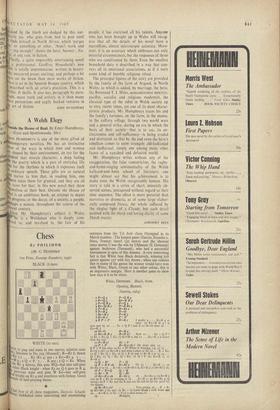A Welsh Elegy
Ly, tside the House of Baal. By Emyr Humphreys.
nib, (Eyre and Spottiswoode, 30s.) 141112 HUIVIPHREXS is one of the most gifted of 's ntemporary novelists. He has an instinctive se of the ways in which men and women shaped by their environment, an eye for the ident that reveals character, a deep feeling the poetry which is a part of everyday life for the rhythms in which it expresses itself ordinary speech. These gifts are so natural ltd native to him that, in reading him, one tt s37 :test takes them for granted, and they are all lhL rarer for that; in this new novel they show '44nselves at their best. Ouisde the House of . )11'1:II is an ambitious book, ants ttempt to depict ges. Progress, or the decay, of a society, a people,
,Nc k.
Perior aaps a nation, throughout the course of the °resent century.
Since Mr. Humphreys's subject is Wales, cr he is a Welshman who is deeply corn- 'lied to, and involved in, the fate of his people, it has exercised all his talents. Anyone who has been brought up in Wales will recog- nise that all the details of his novel have a marvellous, almost microscopic accuracy. More- over, it is an accuracy which embraces not only material circumstances, but the responses of those who are conditioned by them. Even the smallest household duty is described in a way that con- veys all its emotional associations, as if it were some kind of humble religious ritual.
The principal figures of the story are provided by the family of the farm of Argoed, in North Wales; to which is added, by marriage, the hero, the Reverend T. J. Miles, nonconformist minister, pacifist, socialist and religious modernist, the classical type of the rebel in Welsh society up to very ,recent times, yet one of its most charac- teristic products. Mr. Humphreys traces his and the family's fortunes, on the farm, in the manse, in the colliery village, through two world wars and a general strike, during an era in which the basis of their society--that is to say, its ex- clusiveness and self-sutliciency—is being eroded and destroyed, so that by the end even the hero's rebellion comes to seem strangely old-fashioned and ineffectual, simply one among many other facets of a vanished and defeated world.
Mr. Humphreys writes without any of the exaggeration, the false romanticism, the rugby- and-hymn-singing sentimentality of the Welsh kailyard-and-Amis school of literature; one might almost say that his achievement is to make even the Welsh recognisably human. His story is told in a series of short, minutely ob- served scenes, juxtaposed without regard to their time sequence. The effect is more pictorial than narrative or dramatic, as of some large elabor- ately composed fresco, the whole suffused by the elegiac light of a Claude. but each detail painted with the sharp and loving clarity of some Dutch master.
GORONWY REES


































 Previous page
Previous page